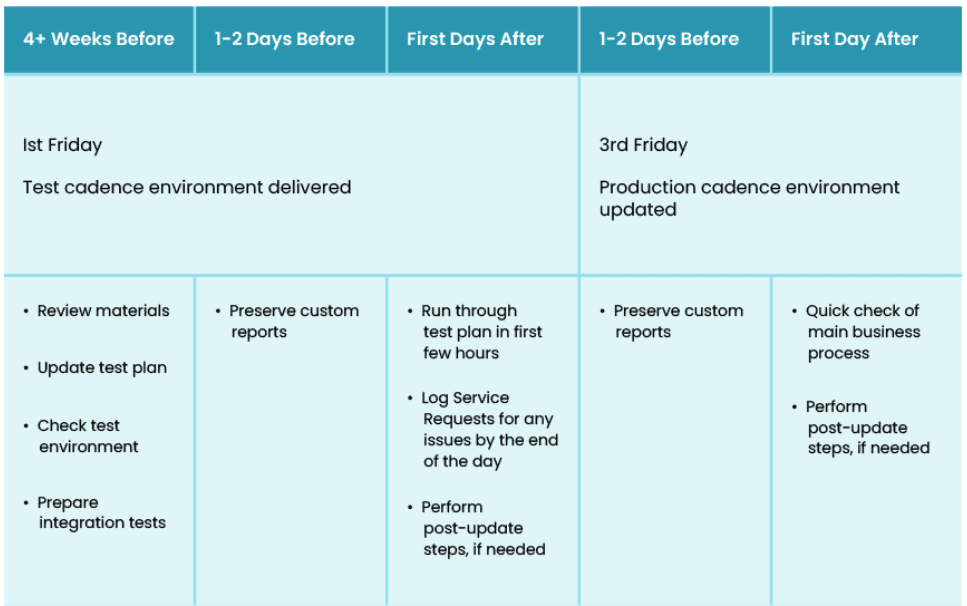Oracle Fusion Payroll is built to simplify, automate, and streamline payroll operations. It is designed to ensure payroll compliance across multiple countries by supporting local tax regulations, statutory deductions, and reporting requirements. Oracle Payroll integrates seamlessly with Oracle Cloud HCM and Oracle Cloud Financials (ERP), minimizing manual efforts and reducing the risk of errors.
Like other Oracle Cloud Applications, Oracle Payroll receives quarterly updates that include new features, bug fixes, and security enhancements.
In this blog, we’ll explore what Oracle Payroll Management quarterly updates entail and why they are critical for maximizing your ROI. We’ll also explain the importance of continuous testing during these updates and how Opkey’s ERP Lifecycle Optimization platform can support this process effectively.
Checklist: Oracle Payroll Module Test Strategy
What are Oracle Payroll Quarterly Updates?
Oracle’s quarterly updates are essential for maintaining and optimizing your Payroll Management application. Apart from new features and functionalities, Oracle Payroll also receives legislative and tax updates. Payroll customers are automatically assigned to receive updates at the start of each quarter (cohort A), as tax updates are released at that time.
Since organizations rely on Oracle Payroll for both global and local compliance, these quarterly updates play a critical role in enhancing functionality, improving security, and ensuring adherence to the latest regulatory standards.
Why is Quarterly Update Testing Critical for Oracle Payroll?
Oracle Payroll Management handles highly sensitive and complex financial data. Due to its complexity, regulatory demands, and the business-critical nature of payroll operations, testing is essential. Even a minor miscalculation or logic error can result in incorrect pay, tax reporting issues, or legal complications.
Here’s why testing Oracle Payroll during quarterly updates is indispensable:
- Payroll processing involves complex calculations, including salaries, taxes, deductions, and benefits. Any errors in payroll calculations, tax withholdings, or statutory deductions can lead to compliance-related issues.
- Oracle releases quarterly updates and patches that may alter payroll logic, formulas, or integrations. Testing before and after these updates is critical to identify discrepancies, prevent unexpected payroll errors, and ensure business continuity.
- Oracle Payroll integrates closely with modules like HCM, Time and Labor, and Absence Management. Quarterly updates can impact these connections, and without thorough regression and end-to-end testing, issues may go undetected until they disrupt payroll or reporting.
- Payroll processes must continue to meet strict statutory requirements and remain audit ready. Quarterly update testing — including test data management and report validation—ensures regulatory compliance and provides the documentation and traceability essential for passing audits.
What Do You Need to Do to Prepare for and Complete an Oracle Payroll Update?
Oracle Payroll quarterly updates are applied to your non-production and production environments on a predefined, predictable schedule. These updates are mandatory, and they cannot be rescheduled. They are first applied to test cadence environments and then to production cadence environments two weeks later.
Learn more: Oracle Fusion Quarterly Releases Testing Timeline and Strategy Guide
The two-week period between an update to your test and production cadence environments gives you time to execute regression testing to confirm that your critical business flows are supported as expected after the update.
Any unexpected issues that are identified need to be reported and resolved with Oracle Support before the scheduled date for the update to your production environment.
Areas to Include in Your Test Plan:
- Integration tests confirming APIs (such as XML, REST) still work and exercise your agents and back-end processes
- Third party external systems (such as rating, distance, and service time engines)
- Key business process flows for various roles in your organization
- Critical custom reports
- UI tests covering users’ day-to-day activity and screens that trigger agent actions
- Custom workflows including saved queries and direct SQL updates
- Automatically available UI
- New enhancements that will apply to you

Challenges in Testing Oracle Payroll Management
Multiple Regression Testing Cycles
Oracle delivers updates 4X a year. Each quarterly update requires regression testing. In addition to quarterly updates, Oracle Payroll also receives mandatory monthly tax updates to keep payroll tax rates and rules up-to-date and compliant. So, business-as-usual testing can be complex and painful.
Short Testing Window
Two weeks is a very short duration to complete regression testing, analyze the results, and raise issues with Oracle.
Scope of Testing
Regression test selection and test case prioritization remain major challenges for most Oracle customers. Guessing what to test — leads either to over-testing, which wastes time and resources, or under-testing, which increases business risk.
Test Script Creation and Maintenance
Creating Oracle Payroll test scenarios from scratch can be a challenging task. In case of Oracle Cloud Applications, a small change or modification in the code make test scripts flaky or brittle which are difficult to maintain.
How Opkey can help in Oracle Payroll Testing?
- Opkey is an official Oracle partner and #1 rated app on Oracle marketplace that reduces test cycles and helps businesses to achieve improved risk coverage and remain compliant.
- Opkey’s ERP Lifecycle Optimization platform provides exact changes between your as-is and to-be processes, helping you avoid over-testing or under-testing and minimizing business risks.
- Opkey’s prebuilt Oracle Payroll test scenarios let you start from day one. With Opkey’s no-code automation, you can convert your manual test cases into automated ones with a single click. Opkey also supports Oracle Payroll parallel testing.
- Opkey’s AI test automation alleviates test script maintenance burden as its self-healing features fix broken tests with a single click. As a result, test maintenance efforts are reduced by 70%.
- Support for 12+ packaged applications and 150 technologies to test complex cross-application business processes ensures end-to-end coverage.
- Opkey’s Quality Lifecycle Management platform helps you with actionable insights into test results for informed decisions.
ERP Lifecycle Optimization with Opkey
Want to learn how Opkey can help you with Oracle Payroll Management Testing? Book a demo



